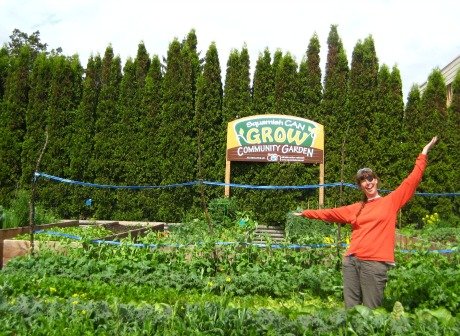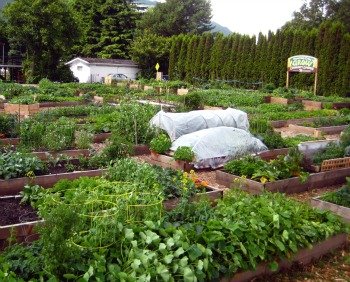
By Philipa Gardiner
Published: July 7, 2012
A vacant lot at the corner of Cleveland and Main streets in downtown Squamish is blooming, thanks to an initiative by the Squamish Climate Action Network (CAN).
With the help of volunteers the empty space has been transformed into a community garden with 53 raised beds, a herb garden and a newly constructed straw bale shed.
Several beds are higher for those with physical issues that make bending down an issue, and one bed is wheelchair accessible.

The garden enables people who have difficulty accessing garden space to grow their own food. Among those who qualify to adopt a bed are seniors, people with physical challenges and those who do not have garden space at their residence.
Each bed or half bed is adopted by an individual or family who plant, tend and harvest whatever they wish. Currently the adopted plots are filled with edibles including kale, potatoes, carrots, peas and lettuce.
According to the garden manager, Carolyn Morris, urban farming projects like the Can Grow Garden enable people to reconnect with their food and food sources.
She used young families in Squamish as an example.
‘They want their kids to know how to grow their own food. They want their kids to appreciate where their food comes from,’ she said.
Food security is another issue Carolyn believes people should be aware of. She challenges people in Squamish to ‘look at their fridge, look at their dinner plate and see how far their food comes’.
Much of the food we buy in Squamish is bought in over land, leaving the food supply vulnerable in the event of a highway closure.
Rather than invoking fear, Carolyn and Squamish CAN want to inspire people to think about their food and support local farmers and community gardens.
Carolyn looks after two plots. As she does not qualify as an adoptee, all the food she grows is donated to Squamish Helping Hands Society
The cost to adopt a plot is $40 per year. Additional funding for the project comes has come from the Community Food Action Initiative (CFAI), Squamish Savings and a number of local businesses have also contributed.
The land belongs to Paramjit and Tejinder Bhulla, owners of the August Jack Motor Inn, who happily allowed their land to be used for similar projects.
Currently, there is a waiting list to adopt a bed for this project although discussions are underway to create further spaces.
If interested in adopting a bed, volunteering for the project or attending one of the gardening workshops held by Squamish CAN you can go to www.squamishcan.ning.com or email cangrowgarden@gmail.com.


heather gee says
This is a wonderfuly successful project by CAN under the enthusiastic guidance of Carolyn. When people wander over from the Saturday Farmers’ Market, there are always rave reviews after they have seen all the healthy vegetables and flourishing gardens. It serves to encourage others to grow their own food when they see how much a relatively small plot can produce.